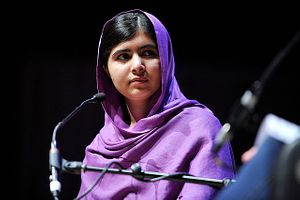The Nobel Peace Prize is once again the center of debate. Or is it unnecessarily being dragged into one? The debate largely turns on Alfred Nobel’s will and its varied interpretations.
The critics claim that this year’s Nobel Peace Prize winners – Malala Yousafzai and Kailash Satyarthi – are not actually eligible for the prize because their work (however praiseworthy) does not fit the criteria that Nobel outlined in his will.
Akhilesh Pillalamarri in his article for The Diplomat highlights this point and goes on to argue that “the Nobel Peace Prize has totally lost sight of its original purpose and has instead become a vehicle for the Nobel committee to make political statements or promote social causes.”
Alfred Nobel, in laying down the conditions for awarding the prize, stipulated that it should be awarded “to the person who shall have done the most or the best work for fraternity between nations, for the abolition or reduction of standing armies and for holding and promotion of peace congresses.”
Pillalamarri goes on to argue that, “it was given to two individuals who, while working for noble causes, did not work together and whose work was only marginally related to the cause of world peace… They did nothing in particular to promote peace and ‘fraternity between nations.’”
The stand taken by Pillalamarri (and many others) is problematic on multiple counts, based as it is on a very narrow interpretation of Nobel’s intent. Alfred Nobel lived at a time when conflicts between states were the order of the day. It was natural for him to emphasize a person’s direct contribution toward the prevention of armed conflict.
International society has changed dramatically since then. International politics today entail far more than the direct state-to-state conflict that was dominant a century or so ago. Non-state actors and a host of socio-economic and cultural factors are much greater forces for war and peace. The turbulent times in which Nobel lived were marred (generally) by violence as a consequence of the expansionist policies of Western countries and the independence/nationalist movements in their colonies. Today, however, conflict is increasingly less between states than it is between states and non-state actors – with innocent civilians often the victims.
Which means that the narrow, literal interpretation of Nobel’s will is obsolete. To accommodate Nobel’s vision in contemporary times, we need a broader interpretation. In addition to active and direct disarmament, aspects like poverty elevation, the rights of children, pro-democracy movements, and environmental campaigns should all be included.
A common thread that has emerged from research into terrorism is that poverty, illiteracy, unemployment, deprivation of rights, and a lack of exposure to new ideas are leading factors for conflict. Particularly in the developing world and countries like India, Pakistan and Bangladesh, the majority of terrorists join terrorist outfits not because they associate themselves with their ideology, but because of their helplessness in the wake of rampant poverty and underdevelopment.
Global peace and “fraternity between nations” today cannot be promoted merely by disarmament and the “abolition or reduction of standing armies” or the “promotion of peace congresses.” At best these are cosmetic, temporary solutions to eternal problems. International fraternity today requires child education, poverty reduction, the aiding of refugees, and environmental conservation.
The contribution to global peace made by poverty reduction and child rights is a good example. If the economically impoverished parts of the developing world, and particularly South Asia, could be elevated from perpetual poverty through programs such as access to microcredit, while simultaneously protecting children from child labor and providing greater education, then we might anticipate a more stable society where the chances of indoctrination and recruitment by terrorist groups diminish markedly.
The same argument can be made for environmental conservation, human rights campaigns, pro-democracy, and women’s rights movements. The mere “abolition or reduction of standing armies,” at least in the present context, will not result in a lasting global peace. These issues of human rights and environmental protection must be part of the interpretation of Nobel’s will when awarding the prize. Otherwise our understanding of peace (and the factors that support it) will be too narrow.
Peace cannot be maintained unless people are capable of maintaining it. And people become capable of maintaining peace when they are liberated from poverty, illiteracy, and repression.
Mother Teresa, The Dalai Lama, Aung San Suu Kyi, Martin Luther King Jr., Nelson Mandela, the United Nations International Children’s Emergency Fund, Liu Xiaobo, Ellen Johnson Sirleaf, and now Mala Yosafzay and Kailash Satyarthi; all have been awarded the Nobel Peace Prize for work not directly reflected in the literal meaning of Alfred Nobel’s will. Their work has encompassed charity, non-violent pro-democracy movements, civil rights movements, anti-apartheid movements, poverty reduction, environmental conservation, child rights, aiding refugees, and women’s empowerment. Yet can anyone claim that their efforts have not contributed to global peace as espoused by Alfred Nobel?
Certainly, the Norwegian Nobel Committee leaves itself open to criticism for conferring the award on people like U.S. President Barack Obama and institutions like the European Union, two recipients responsible for considerable violence as well as peace. It is also reasonable to debate whether Malala and Satyarthi, or any other past recipient, were the best possible choice for the prize. It is acceptable to argue that Malala’s work (though praiseworthy) did not merit a Nobel Peace Prize, or that the work of other children’s rights activists outweighed Satyarthi’s. The selection committee could be criticized for succumbing to political pressures and favoritism. Nor should the Peace Prize be used as a vehicle to make political statements or promote Norway’s foreign policy.
But fair criticism should not be confused with a narrow and anachronistic interpretation of the criteria for the prize.
Mukesh Rawat is a New Delhi-based freelance journalist. Follow him on Twitter @mukeshrawat705.

































